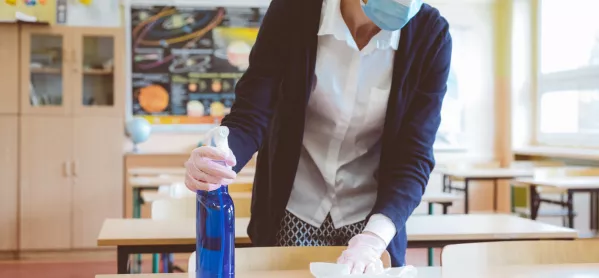Schools have worked at a ferocious pace to ensure they can provide a safe environment, working to ensure high standards of hygiene, promote social distancing wherever possible, and reduce movement around the school to keep students in “bubbles”.
Even last week, there have been further requirements put in place, with schools in areas affected by local lockdowns now required to ensure secondary students and staff wear face coverings in communal areas.
We know that opening up schools is not without risk, even with the rigorous requirements in place. But the evidence is conclusive about the need for children to be back in the school setting.
Fallen behind
NFER’s report, out today - based on data collected at the end of the last academic year - highlights the impact of the Covid-19 pandemic and subsequent lockdown on students, with 98 per cent of teachers reporting that their pupils are behind where they would normally expect them to be.
Primary school teachers estimate that their pupils are three months behind, and secondary school teachers that their pupils are two-and-a-half months behind, with 44 per cent in need of intensive catch-up support.
And, as many had predicted, the impact has fallen hardest on the most disadvantaged. Just under two-thirds of teachers reported that the pandemic had widened the curriculum learning gap. Teachers estimate that the gap between disadvantaged pupils and their peers, in terms of what they had learned in the last year, had increased by 46 per cent.
In addition to needing to catch up on months of lost learning, another challenge for teachers and schools this term will be their ability to provide a broad and balanced curriculum with some of the restrictions still in place.
Negative impact on teaching practices
In July, three-quarters of teachers felt that their normal teaching practices had been negatively impacted by the new restrictions. We should not assume that it will be immediately possible to deliver the same quality of teaching, at the same speed, as before the pandemic.
Today’s report goes into some detail about the impact of restrictions on the use of effective pedagogical practices, such as providing feedback, differentiated support, group work and other forms of peer-to-peer learning.
For this reason, catch-up must be seen as part of the ongoing process of learning recovery, for most pupils, rather than as a quick-turnaround solution.
When inspections resume in January, Ofsted may need to modify expectations of schools if, as expected, social-distancing measures remain in place. And they must be flexible when it comes to assessing how schools have had to reorganise.
This reorganisation will take time and planning - and, unfortunately, it will likely include the need to plan for further local lockdowns. These could result in schools having to pivot to remote learning at short notice.
Knowing more than last time
There is a need to ensure teachers have the resources and training to support high-quality remote learning from home, alongside their pupils, with a continued emphasis on ensuring that children and staff have good access to IT. This is especially true in the primary sector, where too many pupils are otherwise at risk of missing out on more learning.
The growing evidence base should be used to help schools prepare for potential lockdowns. We now know a lot more than we did the first time around about what is associated with higher levels of pupil engagement and a reduced need for catch-up.
This includes making sure an effective platform is in place for sharing and receiving submitted work, training teachers, making provision for online interactive lessons and using strategies that focus on helping pupils to become independent learners, such as metacognitive approaches.
Overall, there will be challenges ahead, although there are opportunities to use what we now know to help reduce any further impact.
The National Tutoring Programme is based on evidence and should help those disadvantaged children who participate to catch up. However, we need to question whether the funding available is sufficient to cope with 44 per cent of children needing intensive catch-up.
And we need to fully evaluate school finances, as many leaders were citing higher costs associated with managing the return of all pupils in this new environment.
Angela Donkin is chief social scientist at the National Foundation for Educational Research (NFER)


